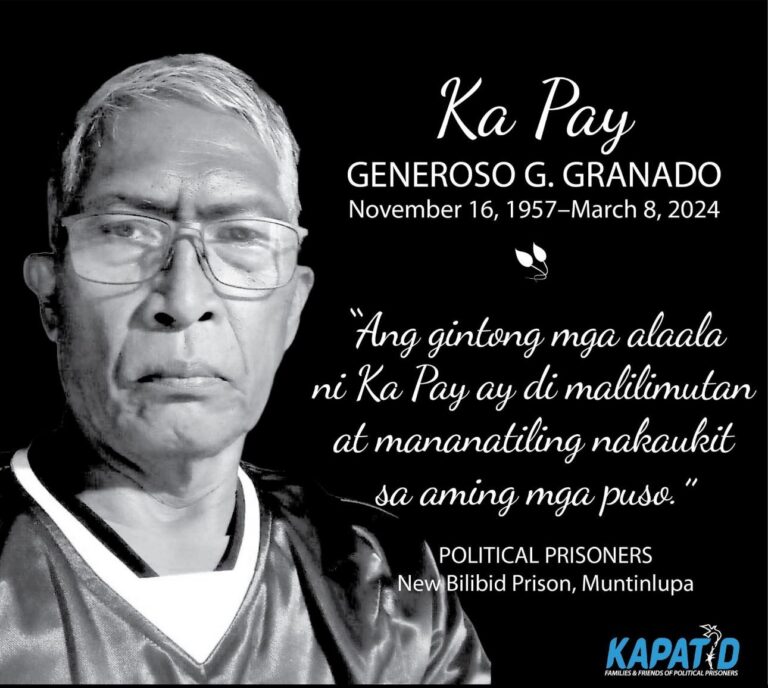
by KAPATID- Families and Friends of Political Prisoners
At the New Bilibid Prison, he was simply a prison number, N209P-0921, and a name, Generoso Gozo Granado. But to the political prisoners, this tall and gaunt 67-year old from Sorsogon was not just an inmate. They affectionately called him “Ka Pay.” A friend to all, a trusted comrade and father figure to those who sought his wisdom and guidance.
The records of Karapatan list him as having hypertension and arthritis. He is among those always included in the long lists that we in Kapatid submit to the Department for Justice for humanitarian release for being elderly and sick.
He was in fact a step away from freedom. Only the Bureau of Corrections (BuCor) clearance and psychological interview were lacking for his release, according to his daughter Heidi, which she was following up with the BuCor documents division.
The larger prison of government indifference and neglect snuffed out even that glimmer of freedom. On March 8, around 3 a.m., Ka Pay suffered a heart attack in Building 11B at the Maximum Security Compound. He could not be brought out immediately to the hospital inside the compound because inmates are padlocked inside their buildings at nighttime. The BuCor death certificate states he passed away at the NBP hospital at 4 a.m. of myocardial infarction.
I only met him a few times and that was when we came to the IVSU area of the NBP Maximum Security Compound to bring food and news of the outside world. Quiet and unassuming, he is one of the little known political prisoners who currently number 782. But I’ve come to know more about him from the flow of tributes that we have been receiving from his fellow inmates and his own family.
An only child from a peasant family in Barangay Lapinig, Magallanes, Sorsogon, he sired 16 children. Four from his first marriage until his wife died and twelve from his second marriage, as if to make up for being the lone offspring.
He sustained his big brood from a livelihood of farming and using his talent as a carpenter. In the ’80s, as land disputes and militarization arose in Bicol, he turned his talents to organizing his fellow farmers to protect their rights to the land they till. His advocacy of peasant issues and deepening political engagement landed him in prison by August 25, 2004 on fictitious criminal charges and an ensuing conviction.
Says his daughter Heidi, “Ang Papa po napakabait, mahinahon at maprinsipyong tao. Dahil sa prinsipyo kaya siya nakulong. Ang sabi niya noon, Bakit ako magpapiyansa, hindi naman ako pumatay?”
Even in prison, she says her father fulfilled his duties as a provider. “Si Papa kahit nakakulong ginampanan niya pa rin ang tungkulin niya bilang magulang sa aming magkakapatid. Nong administrasyon ni Pangulong Arroyo, nagkaroon siya ng trabaho sa loob. Mahusay siyang karpintero. Lahat ng kinikita niya sa mga nagpapagawa sa kanya ay pinapadala niya kay Mama. Kahit kailan hindi siya naging pabigat sa amin.”
But when the prison administration changed, things got stricter in the NBP: “Naghigpitan sa NBP at kinumpiska lahat ng gamit niya sa pagkakarpintero kaya natigil ang trabaho at pagpapadala niya kay Mama. Madami nangyari at nahirapan na rin kami sa pagdalaw-dalaw.”
But she says her father was resourceful. “Nag-isip pa rin siya ng paraan para kumita. Tuwing nabibigyan ko pala siya ng allowance ay pinupuhunan niya ito sa pagtitinda ng pinipig, yong nginanganga.”
“Maalalahaning tatay si Papa. Kaya napakahirap tanggapin ang pagkawala niya. Sabi niya pa sa amin, gustong gusto niya na makalabas kasi gusto niya makita mga apo niya at kami. Kaya ang pait ng reunion namin,” Heidi says as their family prepares to bury him this week in the local cemetery. That anguish echoes inside the bowels of prison where he fostered a larger family that looked up to his advice and example.
“Tatay Pay kung aming tawagin ay isang tahimik at mapagpasensyang kasama. Masipag at kahanga-hanga ang husay niya sa pagkakarpintero. Ang kanyang talentong ito ay nakatulong ng malaki sa mga kasama sa pagkukumpuni at maging sa aming dormitory siya kadalasan ang nag-aayos,” notes one tribute from Building 11-B, one of the small quarters of political prisoners inside the Maximum Security Compound where he often took charge of organizing.
“Ang pagpanaw ni Tatay Pay ay nagdulot ng kalungkutan sa aming hanay. Parang napakaraming kulang o nawala. Tunay na malaking kawalan o kabawasan siya sa amin, na minsan ay itinuturing naming ama.” “Ang isa pang nakakalungkot – kung maayos at mabilis ang pagproseso ng pagpapalaya baka sakaling sa huling sandal ng kanyang buhay ay nakasama pa niya ang mga mahal sa buhay.”
Another tribute notes: “Ang pinakamagandang katangian niya ay ang pananatiling matibay sa panininidigan kahit sa kabila ng kahirapan sa mahabang pangungulungan. Di siya nagpatalo sa masasamang impluwensiya sa loob ng piitan. Mahusay siyang magbigay payo sa mga kasama.”
Together with the political prisoners at the NBP and across the country, Kapatid extends our deepest condolences and heartfelt prayers to Genoroso Granado’s bereaved family.
“Salamat Ka Pay at naging bahagi kayo ng aming mga buhay. Hindi mababalewala ang halaga ng inyong buhay. Ang ginto niyong alaala ay di malilimutan at mananatiling nakaukit sa aming mga puso.” ###
